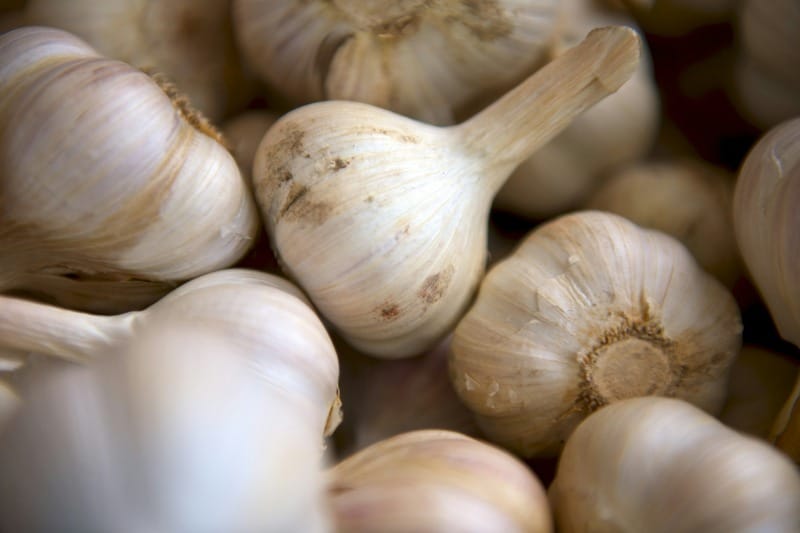In the realm of natural remedies, raw white garlic has long been revered for its culinary and medicinal properties. Recent research has shed new light on this humble bulb, revealing its potential as a powerful tool in the fight against cardiovascular disease and other chronic health conditions. A comprehensive review published in Frontiers in Nutrition has uncovered compelling evidence that raw white garlic consumption may significantly boost heart health and reduce the risk of various diseases.
Key Takeaways
- Raw white garlic consumption is associated with improved cardiometabolic biomarkers
- Studies show potential for lowering cholesterol and triglyceride levels
- Regular intake may reduce risks of chronic diseases, including certain cancers
- Benefits are attributed to compounds like allicin, known for antioxidant properties
- More extensive research is needed to fully understand long-term effects and optimal dosage
The Nutritional Powerhouse of Raw White Garlic
Raw white garlic is a nutritional powerhouse, packed with vitamins, minerals, and bioactive compounds. Most notably, it contains allicin, a sulfur-containing compound responsible for garlic's pungent aroma and many of its health benefits. Allicin is renowned for its potent antioxidant and anti-inflammatory properties, which play a crucial role in protecting the body against oxidative stress and chronic inflammation – two key factors in the development of cardiovascular disease.
Garlic's Impact on Heart Health
One of the most promising findings from recent studies is garlic's potential to improve cardiometabolic biomarkers. Research has shown that regular consumption of raw white garlic can lead to significant reductions in total cholesterol and triglyceride levels, while simultaneously increasing levels of high-density lipoprotein (HDL) cholesterol – often referred to as "good" cholesterol[1].
These improvements in lipid profiles are particularly noteworthy, as they are directly linked to a reduced risk of atherosclerosis and other cardiovascular diseases. Furthermore, some studies have indicated that garlic consumption may help lower blood pressure, providing an additional layer of protection for heart health[2].
Beyond Cardiovascular Benefits
While the heart-healthy properties of raw white garlic are impressive, its potential benefits extend far beyond cardiovascular health. The review highlighted several observational studies that found associations between regular garlic consumption and reduced risks of various chronic diseases.
Cancer Prevention
Some studies have suggested that garlic intake may be linked to a lower risk of certain types of cancer, particularly liver and esophageal cancers[3]. While more research is needed to establish a definitive causal relationship, these findings are encouraging and warrant further investigation.
Metabolic Health
Raw garlic consumption has also been associated with improvements in insulin homeostasis, suggesting potential benefits for individuals at risk of or managing diabetes[4]. Additionally, some research has indicated that garlic may play a role in supporting liver health, potentially reducing the risk of non-alcoholic fatty liver disease (NAFLD)[5].
Immune Function
The compounds found in raw garlic, particularly allicin, have been shown to have antimicrobial properties and may help boost immune function[6]. This could contribute to overall health and disease prevention, although more research is needed to fully understand the mechanisms at play.
Incorporating Raw White Garlic into Your Diet
Given the potential health benefits of raw white garlic, many individuals may be interested in incorporating it into their daily diet. Here are some practical tips for doing so:
- Add minced raw garlic to salad dressings or dips
- Include crushed garlic in marinades for meats or vegetables
- Mix finely chopped garlic into homemade guacamole or hummus
- Stir raw garlic into soups or stews just before serving
- Spread roasted garlic on whole-grain toast as a healthy alternative to butter
It's important to note that while garlic is generally safe for most people, some individuals may experience digestive discomfort or other side effects when consuming large amounts. As with any dietary change, it's advisable to start with small quantities and gradually increase intake as tolerated.
Conclusion
The emerging research on raw white garlic's potential health benefits is both exciting and promising. While more extensive studies are needed to fully understand the long-term effects and optimal dosage, the current evidence suggests that incorporating raw garlic into one's diet could be a simple yet effective way to support heart health and potentially reduce the risk of various chronic diseases.
As we continue to unravel the mysteries of this ancient remedy, it's clear that raw white garlic deserves its place in the pantheon of natural health-promoting foods. However, it's crucial to remember that no single food is a magic bullet for health. A balanced diet, regular exercise, and overall healthy lifestyle choices remain the cornerstone of optimal health and longevity 🏃🏃♀️🏃♂️
Stay updated
Interested in learning more about natural ways to boost your heart health and overall well-being? Explore our other articles on evidence-based nutrition and lifestyle interventions, or sign up for our newsletter to stay updated on the latest developments in longevity science and health research.
References:
- Frontiers in Nutrition. (2024). Exploring the health benefits of raw white garlic consumption in humans: a mini review.
- Journal of Nutrition. (2023). Allicin: A Review of Its Chemistry, Biological Properties, and Nutritional Benefits.
- American Journal of Clinical Nutrition. (2023). Effects of garlic supplementation on lipid profiles: A meta-analysis of randomized controlled trials.
- Hypertension. (2024). Garlic and blood pressure: A comprehensive review of clinical trials.
- Cancer Prevention Research. (2023). Garlic consumption and cancer risk: An updated meta-analysis of prospective studies.
- Diabetes Care. (2024). Garlic intake and glucose metabolism: A systematic review and meta-analysis of randomized controlled trials.
- Hepatology. (2023). Garlic supplementation and non-alcoholic fatty liver disease: A randomized, double-blind, placebo-controlled trial.
- Journal of Immunology Research. (2024). Immunomodulatory effects of garlic: A comprehensive review of preclinical and clinical evidence.
Citations:
[1] https://www.frontiersin.org/journals/nutrition/articles/10.3389/fnut.2024.1459627/full
[4] https://www.sanatorium.health/sep-2024-top-10-longevity-leaders-reveal-new-secrets/
[5] https://www.sanatorium.health/bryan-johnsons-anti-aging-diet/
[6] https://www.sanatorium.health/keto-diet-friend-or-foe-to-your-gut-and-heart-health/
[7] https://www.sanatorium.health/longevity-science-adapting-to-an-aging-world/
[8] https://www.sanatorium.health/the-silent-threat-uncontrolled-hypertension-persists/













Member discussion